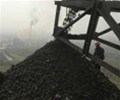

The price of metallurgical coal has risen to record levels as trade tensions and border problems push the cost for Chinese importers sky-high.
Coal for coking purposes has soared despite declines in iron ore values attributed to Chinese steel-makers abiding by a government directive to avoid buying from Australia.
The value has surged to $US410 a tonne in the past week, representing a more than tripling in price since early 2020.
Coking coal is now overtaking iron ore as the largest input cost for many of the world’s steel mills.
Mining analyst Peter Strachan said while the booming price appeared counterintuitive given the slide in iron ore demand, logistical issues in Asia were at play.
“Normally they get a lot across the border from Mongolia but COVID restrictions have meant they haven’t been able to get enough truck drivers to do it,” he said.
“Shipping costs have skyrocketed, the Chinese are just scrambling and paying over $US500 a tonne for the stuff delivered. Ex-Newcastle it’s well over $US400, that’s a new high.”
With poor domestic supplies of metallurgical coal, Chinese buyers were racing to source shipments from across Asia, North America and as far afield as Columbia as a result.
As a result of China’s hunt for new suppliers, major steel-making nations with limited domestic metallurgical coal such as India, Taiwan, South Korea, Japan and the EU are now increasingly turning to Australia.
Director of the Bowen Basin Mining Club Jodie Currie said the loss of the Chinese market had opened new doors for the region’s miners.
“I think it gave them opportunity to look at other markets, Queensland coal is sought after across the world,” she said.
“There were certainly shock waves sent through the industry but we’ve diversified, we’ve looked at other markets.”
Property market-induced slide
Concerns over the financial woes of Evergrande, one of China’s leading property developers has been seen by many commentators as a catalyst for the declining iron ore value.
Analyst Peter Strachan said, with increased recycling of metals domestically, metallurgical coal demand in China could reach a peak soon.
“Eventually there will be a correction, the Evergrande issue is going to put a hiatus on the expansion of steel-making,” he said.
“We’re also seeing a lot more scrap iron coming though the [steel production] system, eventually China’s going to move towards 20, 30 per cent of their steel coming from scrap.”
Falling steel production through July and August as a result of the planned cap on steel-making has been mirrored by a decline in other polluting industries such as cement, another sector blamed for poor air quality in Chinese cities.
“There are a number of climate-related, clean-air issues, the big polluters tend to cut back ahead of winter, especially with the Winter Olympics coming,” Mr Strachan said.
After the price of iron ore crashed from $230 in May to as low as $93 a tonne in recent weeks, some stability returned to the market in recent days following indications Evergrande will pay interest payments due today.
The price rose back above the $US100 mark in mid-week trade.
Supply-side constraints
The Queensland Resources Council’s (QRC) recent state of the sector report highlighted a skilled worker shortage as a handbrake on mining’s expansion during the COVID-19 era.
Describing the situation as a “perfect storm of labour shortages at a time of continued growth” CEO Ian McFarlane pointed to government predictions that Queensland’s coal exports would rise 23 per cent by 2025.
Finding and retaining skilled employees rose to number one in the QRC’s latest CEO sentiment survey as workers across the mining sector surged to 85,000, a two-thirds increase in five years.
“This growth in resources jobs, which has surged since COVID, is around six times the relative growth experienced across the rest of Queensland’s workforce over the same five-year period,” Mr McFarlane said.
Ms Currie said the industry accepted it had failed on worker retention in the past and was committed to changes.
“We have probably done ourselves an injustice over the years in not investing as much as we should have,” she said.
On concerns from the CFMEU about growing casualisation in the workforce, Ms Currie said miners were best placed to decide how to operate their workforces.
“I can see where [unions] are coming from and there are challenges but for mining companies there are reasons for that.”
The QRC plans to expand its Queensland Minerals and Energy Academy, aimed at encouraging students into mining and associated careers to 100 schools by 2023.
Source: ABC.net